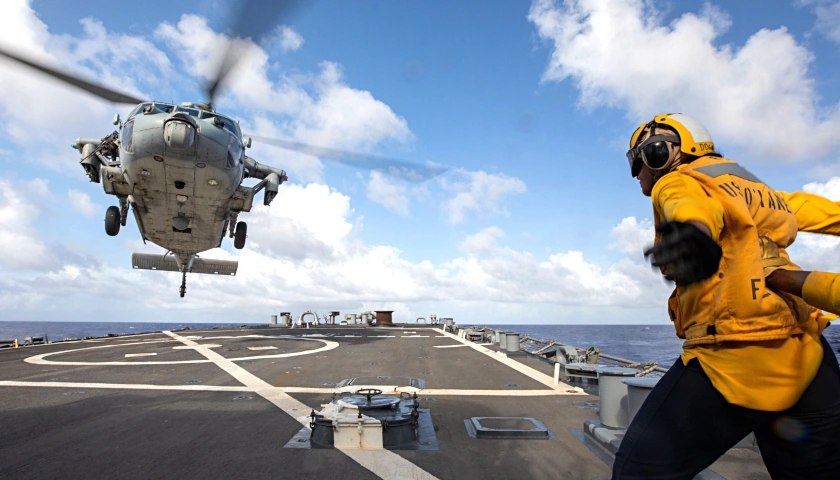by James E. Fanell and Bradley A. Thayer
In March 2015, the former Commander of the U.S. Pacific Fleet, Admiral Harry Harris, while giving a speech in Australia, dismissed the People’s Republic of China’s (PRC) building of seven artificial islands in the South China Sea (SCS) as nothing more than a “Great Wall of Sand” that would not alter the U.S. Navy’s freedom of navigation operations or American deterrence capabilities in the region. Harris’s remark was a classic case of what we term “threat deflation.” Year after year, U.S. officials have dismissed the growth of the PRC capabilities that were right in front of their noses. Now, almost a decade later, the reality of that arrogance has come home to roost. The PRC’s seven islands are now fully operational military bases and are being used by the PLA to dominate the SCS and bully and intimidate treaty allies like the Republic of the Philippines.
In sum, the PRC’s “Great Wall of Sand” has not eroded. Rather, it has hardened to the detriment of U.S. national security and the peace and stability of the Indo-Pacific region. Given the PRC’s most recent pressure campaign against the Philippines over the past four months at Second Thomas Shoal (Ayungin Shoal), it would be more accurate to say that U.S. national security credibility in the South China Sea is “eroding like a Great Wall of Sand.”
The PRC has publicized an agreement reached with the Philippine government on July 22. This asserts that the Philippine government must notify the PRC before conducting a resupply of the sailors aboard the grounded ship, Sierra Madre. Providing prior notification to the PRC and even inspection by the Chinese Coast Guard (CCG) would in effect demonstrate that the Republic of the Philippines no longer maintains “sovereign control” over their maritime territory at Second Thomas Shoal. And while the Philippine government has denied the specific terms of the agreement with the PRC, the international perception is that Manila has again been forced to cede its territory to Beijing. This would now be the second major successful seizure of Philippine territory by the PRC in just over a decade, the first being at Scarborough Shoal in 2012.
As such, this represents another massive failure by the Biden administration, led by their foreign policy team of Secretary State Anthony Blinken, National Security Advisor Jake Sullivan, and Deputy Secretary of State Kurt Campbell, who was also directly involved with the debacle at Scarborough twelve years ago.
This bullying of America’s treaty ally comes at the same time Anthony Blinken and Secretary of Defense Llyod Austin are making their “farewell tour” through the Western Pacific with their 2+2 dialogue in Manila on July 30. While the U.S. publicly announced it would provide Manila with $500 million in “foreign military financing,” the sad fact is that the U.S. has failed to do the one thing that would bolster American deterrence—provide direct military assistance to the resupply and fortification of the Sierra Madre, the locus of attention for the Chinese Communist Party (CCP).
The situation at Second Thomas Shoal, for the most part, had been a dormant issue from the grounding of the Sierra Madre in 1999 to 2014 as the PRC’s maritime power was not able to enforce the CCP’s will. However, since 2015, the PRC has become the dominant maritime force in the South China Sea. Their right-here, right-now presence demonstrates to all audiences on a daily basis that they own the South China Sea. Thus, for almost a decade, the world has witnessed their increasing control while successive U.S. administrations sat by and allowed the PRC to continue cementing their hold over the South China Sea (and elsewhere inside the First Island Chain). The U.S. State Department has repeatedly refused requests from the Fleet to stand up and take action.
We are now at the apex of another surge by Beijing that has been going on for the past six months. Even across the larger time span of the last decade, never once did the U.S. Seventh Fleet get the go-ahead to help our treaty ally resupply or even fortify the eroding and rusted out Sierra Madre at the shoal.
The erosion of the Sierra Madre is an unfortunate but perfect metaphor for the dissolution of American credibility with its allies and partners. The Republic of the Philippines specifically and privately requested the U.S. 7th Fleet’s support. Unfortunately, each request was turned down during the Obama administration and continues to be denied by many of the same figures who are now running the Biden administration’s foreign policy.
These are facts known to our allies and friends across the region. America, especially the Biden-Harris Regime, has become a laughingstock, especially as we promote exercise RIMPAC in the waters of Hawaii or with our Secretary of Defense and Secretary of State conducting narcissistic “farewell” tours of the region while collecting faux accolades.
If Americans are not aware of what is happening in the SCS, or if they are misinformed that it is just a bunch of rocks that are not important or are another “endless war,” then U.S. national security and the American people will be doomed to suffer the consequences of the PRC’s tyrannical global agenda. The PRC is pushing hard against the Philippines and Americans should understand that this action is stark evidence of the PRC’s willingness to turn to overt aggression to achieve their strategic aims.
Communist leader Xi Jinping is well aware of what Lenin tasked all Communists to do: “You probe with bayonets: if you find mush, you push. If you find steel, you withdraw.” The only steel that the PRC is encountering is from the Philippines. It is time that some American “steel” fortified Washington’s treaty ally.
Accordingly, the people of the Philippines should be applauded for the courage and “steel” they have demonstrated in standing up to the PRC. The likes of Kurt Campbell, Jake Sullivan, Tony Blinken and Lloyd Austin should be held accountable for their fear and fecklessness in the face of Beijing’s belligerence.
Time is running out, as the PRC’s aggression against the Philippines is certainly calculated with one eye on the U.S. election calendar and the realization of what the CCP fears—Donald Trump’s return to the presidency. Only by electing Trump can we even have a chance of stemming the erosion of American power against the PRC’s “great wall of sand.”
– – –
James E. Fanell and Bradley A. Thayer are authors of Embracing Communist China: America’s Greatest Strategic Failure from which this article is drawn.




